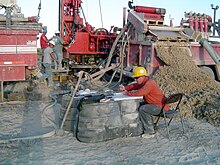Economic geology

Economic geology is concerned with earth materials that can be used for economic and/or industrial purposes. These materials include precious and base metals, nonmetallic minerals, construction-grade stone, petroleum minerals, coal, and water. The term commonly refers to metallic mineral deposits and mineral resources. The techniques employed by other earth science disciplines (such as geochemistry, mineralogy, geophysics, petrology and structural geology) might all be used to understand, describe, and exploit an ore deposit.
Economic geology is studied and practiced by geologists. However it is of prime interest to investment bankers, stock analysts and other professions such as engineers, environmental scientists, and conservationists because of the far-reaching impact that extractive industries have on society, the economy, and the environment.
Purpose of studies
The purpose of studies of the subject is as follows:
- The subject of Economic geology is aimed to provide a detailed description of economic and geologic materials, the number of which is estimated to be around 200. Besides the detailed description of these materials, the subject also discusses their proper use and development. The foremost duty of economic geologists is to determine the suitability of a mineral given a particular industry.
- From an economic perspective, a mineral's reserve is limited, its occurrence variable, and it's supply non-replenishable; once a mineral is fully extracted, its reserve is exhausted. These concerns are what motivate an economic study of geology. A wise economic geologist repares a plan for the mineral deposit according to proper utilization before extraction.
Mineral resources
Mineral resources are concentrations of minerals significant for current and future societal needs. Ore is classified as mineralization economically and technically feasible for extraction. Not all mineralization meets these criteria for various reasons. The specific categories of mineralization in an economic sense are:
- Mineral occurrences or prospects of geological interest but not necessarily economic interest
- Mineral resources include those potentially economically and technically feasible and those that are not
- Ore reserves, which must be economically and technically feasible to extract
Ore geology

Geologists are involved in the study of ore deposits, which includes the study of ore genesis and the processes within the Earth's crust that form and concentrate ore minerals into economically viable quantities.
Study of metallic ore deposits involves the use of structural geology, geochemistry, the study of metamorphism and its processes, as well as understanding metasomatism and other processes related to ore genesis.
Ore deposits are delineated by mineral exploration, which uses geochemical prospecting, drilling and resource estimation via geostatistics to quantify economic ore bodies. The ultimate aim of this process is mining.
Coal and petroleum geology

- See main articles Coal and Petroleum geology
The study of sedimentology is of prime importance to the delineation of economic reserves of petroleum and coal energy resources.
References
- U.S. Geological Survey Circular 831, Principles of a Resource/Reserve Classification for Minerals (PDF format)
- Dill, H.G., 2010. The “chessboard” classification scheme of mineral deposits: Mineralogy and geology from aluminum to zirconium. Earth-Science Reviews Volume 100, pp.1-420, 2010

